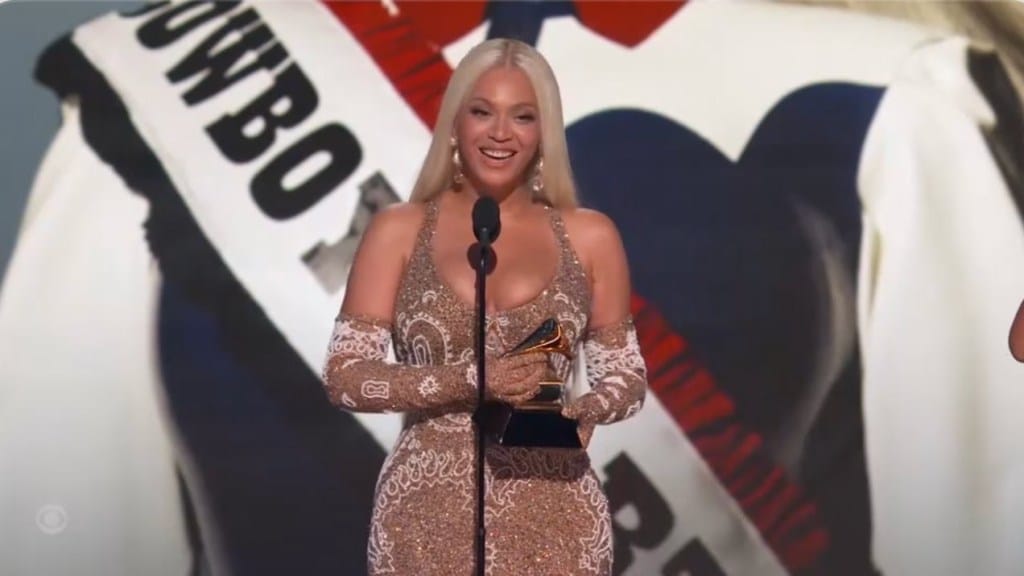Table of Contents
The Long-Awaited Triumph
After years of near misses and eager anticipation from her global fanbase, Beyoncé finally secured the coveted Album of the Year Grammy on Sunday night for “Cowboy Carter.” This historic win arrived after four previous nominations in the same category had not earned her the top prize. The whole moment was a reason for cheer and praise from fans who were longing to see the talented star get awarded.

Taking the stage to accept her award, Beyoncé expressed her deep thanks to everyone who made the project an absolute success. “I just feel very full and very honored. It’s been many, many years,” she admitted. While addressing the crowd, she added, “I just want to thank the Grammys, every songwriter, every collaborator, every producer, for all of the hard work. I want to dedicate this to Miss (Linda) Martell, and I’ll just hopefully keep pushing forward, opening doors.” Her words underscored the many artists who helped shape “Cowboy Carter,” emphasizing a collective effort that brought this ambitious, genre-spanning album to fruition.
Beginning her acceptance speech with the words of gratitude towards those who helped her in the project, Beyonce shared her gratitude with collaborators “I’d like to thank and acknowledge and praise all the firefighters for keeping us safe,” the diva spoke, pointing to the assembled crew of firefighters that accompanied her on stage to hand out the night’s last award. This dedication highlighted Beyoncé’s recognition of the real-world heroes who provide vital services to communities everywhere.
Breaking the Nomination Record
Host Trevor Noah followed Beyoncé’s speech by marveling at her accomplishment. “She had 99 nominations, and now an album of the year win is one,” he quipped, turning to Jay-Z as he noted the record number of nominations Beyoncé entered this year’s ceremony with. The enormity of her career achievements became even clearer in that moment: after decades of producing groundbreaking music, she finally added an Album of the Year victory to her already expansive list of accolades.
Though “Cowboy Carter” crosses multiple genres, it was framed as a concept album that underscores how country music is deeply rooted in Black musical traditions. The project also celebrates the continued presence and influence of Black artists in the genre, featuring contributions ranging from rising star Shaboozey to pioneering country trailblazer Linda Martell. By blending modern beats, classic country motifs, and an array of featured voices, Beyoncé crafted a work of art that both honors tradition and expands possibilities for what the sound of country can be.
With her win for “Cowboy Carter,” Beyoncé became the first Black woman since Lauryn Hill in 1999 to secure the Album of the Year honor. This achievement places her in a rare echelon of Grammy history, shining a spotlight on her artistic evolution and the powerful impact of her music. While the road to this moment was lengthy, it culminated in a resounding victory that will undoubtedly inspire other artists—especially Black women—to push boundaries and envision new possibilities for the music industry’s future.
The Anticipated Yet Uncertain Win
Most award analysts heavily predicted that Beyoncé’s album “Cowboy Carter” would take home the coveted Album of the Year trophy. Despite the collective confidence, a sense of nervousness accompanied such forecasts, particularly because some of her previous high-profile albums—like “Lemonade”—had considered near-locks in the past yet still missed out on the top honor. These predictions began nearly a year ago, back when the album initially dropped last March. At the time, Variety published an article with a bold headline, posing the question, “Is Beyoncé’s ‘Cowboy Carter’ an Unstoppable Frontrunner for the Album of the Year Grammy?”
Fueling this speculation was the undeniable cultural impact of the record, which appeared unbeatable given its resonance with listeners and critics alike. Even a particularly impressive group of contenders in this year’s field seemed unlikely to hinder its momentum, as the enthusiasm and sheer enjoyment people derived from “Cowboy Carter” stood out above the crowd. However, even with all signs pointing toward a victory for Beyoncé, many recognized that “Cowboy Carter” faced formidable competition from a handful of other acclaimed albums. Two frequent Album of the Year favorites—Billie Eilish and Taylor Swift—were back in the race, each with their own dedicated followings and track records of Grammy success.
Meanwhile, the category also welcomed a wave of emerging sensations such as Chappell Roan and Sabrina Carpenter, both of whom had experienced meteoric rises. Additionally, the ever-intriguing Charli CX was on the shortlist, touted as the “It Girl” by numerous outlets. Rounding out the eight-album lineup were Jacob Collier and Andre 3000, both perceived as the dark horses in a competition brimming with heavy hitters and groundbreaking artists. Despite their status, they contributed to making this one of the most fiercely contested Album of the Year.
Another Night of Multiple Wins
On Sunday evening, Beyoncé made her second trip to the Grammy stage, solidifying it as a night of outstanding victories for the globally admired artist. During the prime-time telecast, she graciously accepted the country album of the year award, presented by fellow superstar Taylor Swift. Before that broadcast moment, she had also picked up a third honor in the pre-telecast premiere ceremony for best country duo/group performance, which recognized her collaboration with Miley Cyrus on the track “II Most Wanted.” As these awards accumulated, her status as one of the most honored musicians in history only grew, reflecting a new chapter in her artistry. Observers marveled at Beyoncé’s ability to venture into country territory and still capture the hearts of voters from across the musical spectrum.

Despite coming into the ceremony holding the astonishing records of the most nominations and the most overall wins in Grammys history, Beyoncé’s supporters had often expressed disappointment about her track record in the top three all-genre categories—album of the year, record of the year, and song of the year. While she had previously triumphed in the song of the year field, she had never claimed the album of the year or record of the year titles before this particular Sunday. Fans and critics alike found it puzzling that her pioneering releases frequently dominated shortlists but fell short at the finish line in categories that span the entire industry. Nevertheless, her sweeping success on this night helped counter that narrative, as she confidently embraced fresh accolades in a realm where she had remained conspicuously unrecognized for far too long.
Tension Over “Lemonade”
Much of the frustration surrounding Beyoncé’s Grammy history stemmed from her iconic album “Lemonade,” which many regarded as an artistic landmark deserving of the top honor. However, that record lost out to what some contended was a less significant Adele project, prompting widespread debate. Indeed, “Lemonade” was praised for its innovation, cultural resonance, and bold storytelling, factors that left many supporters stunned to see it snubbed in album of the year voting. This discontent extended beyond her fan community; during her acceptance speech that year, Adele herself publicly addressed Beyoncé, suggesting that “Lemonade” rightfully should have taken the top prize instead. This highly unusual gesture of humility underscored the depth of the controversy and solidified the album’s status as a Grammy injustice among many observers.
In that same moment, Adele’s heartfelt apology to Beyoncé served not just as an astonishing show of grace but also as an acknowledgment that the Academy had made a questionable choice. This scenario ignited further discourse about the Recording Academy’s voting dynamics, from the influence of genre biases to potential underappreciation of groundbreaking works by Black women artists. Adding an extra layer of gravity to the situation, Beyoncé’s husband, Jay-Z, was notably vocal in criticizing how her most acclaimed albums repeatedly lost in the biggest categories. For years, these discussions simmered under the surface, fueling a strong desire to see Beyoncé finally secure the kind of industry-wide validation she and her devotees believed she had long deserved. When the moment finally arrived on Sunday night, it represented not only a personal milestone for her career but also a remedy for the lingering dissatisfaction built up over time.



